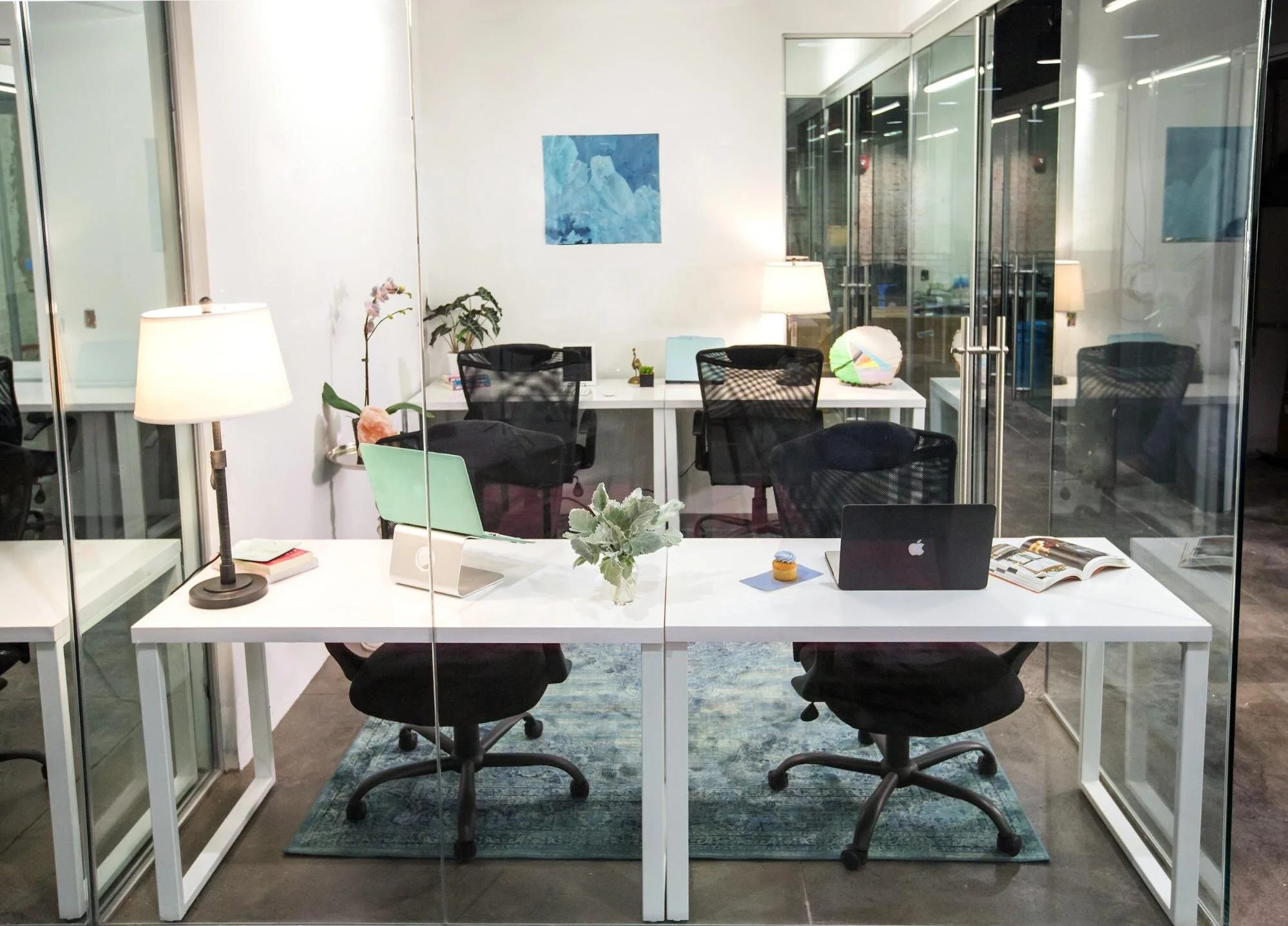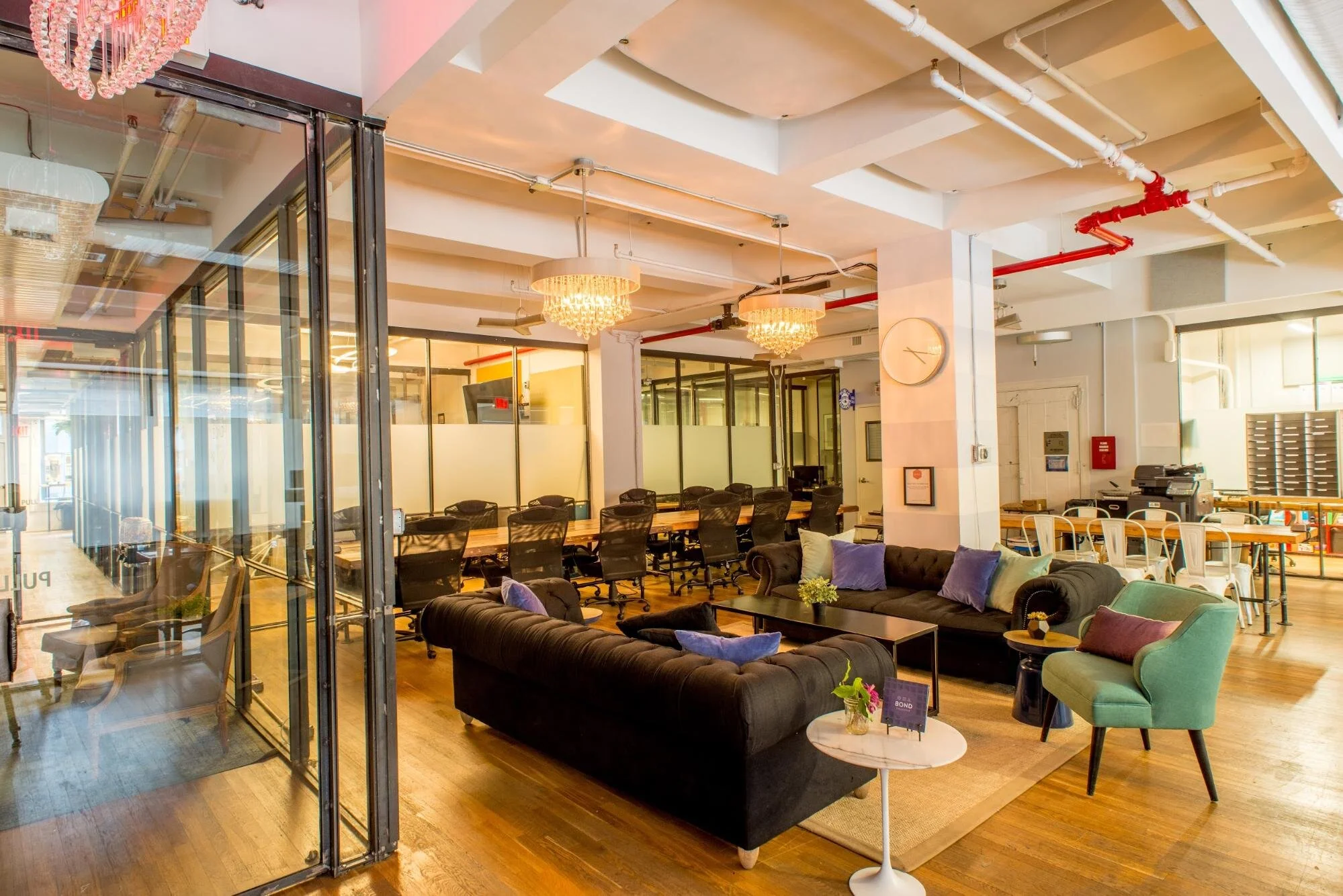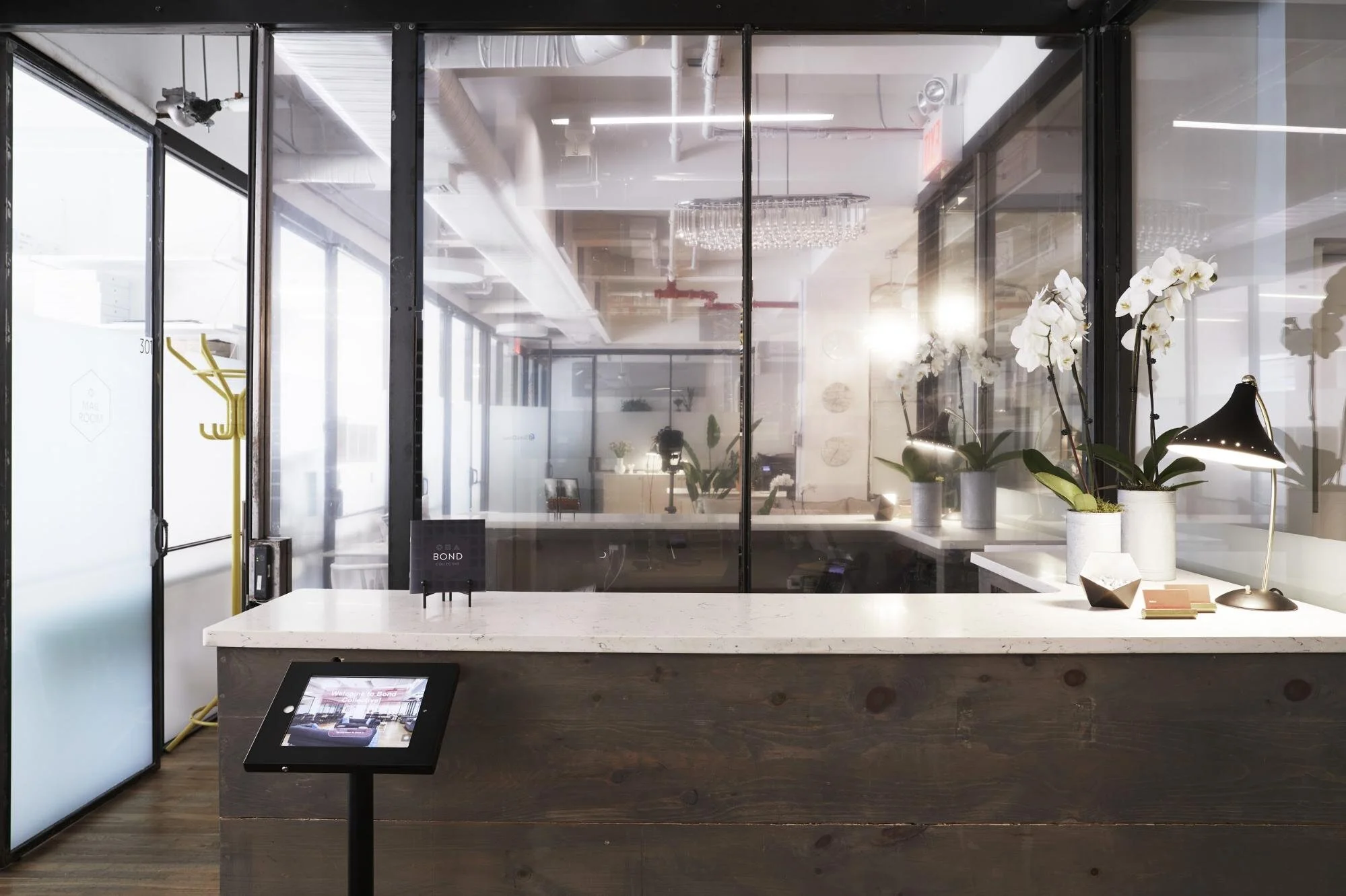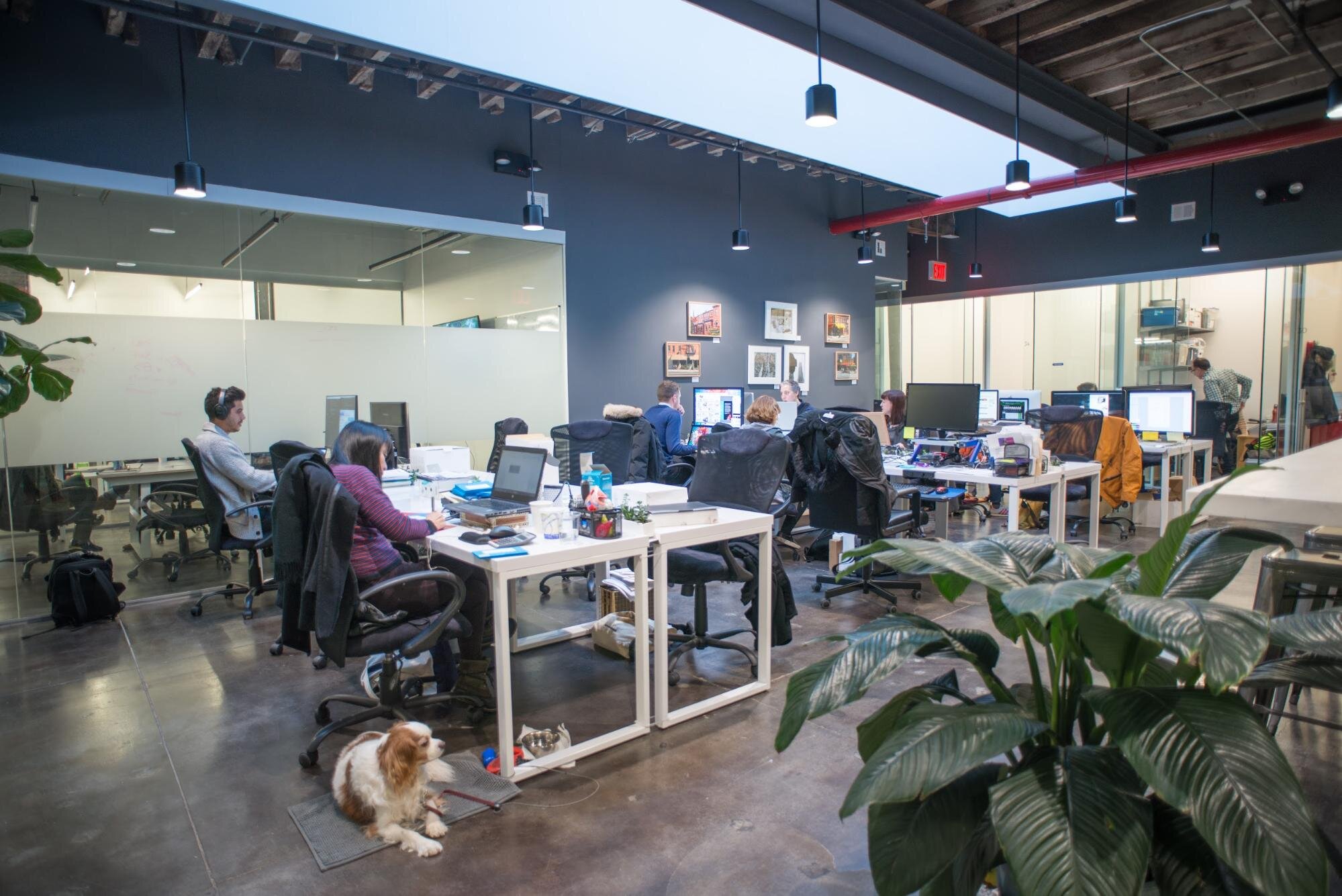By Bond Collective Staff
Hot desking and hoteling are two popular seating options for individuals and teams that can revolutionize the way you do business.
While these workspace arrangements are most practical and popular in collaborative environments, businesses that operate out of their own space can implement them to good advantage as well.
In this article, we’ll discuss the benefits and drawbacks of hot desking and hoteling as they relate to coworking spaces, but the same information applies to seating arrangements in dedicated and private offices everywhere.
The Modern Office Model
In the more traditional office model of the past, the HR department assigned each team member their own workspace based on what was available at the time.
Each employee worked from their own personal space (their desk) until they left the company, moved to a different job, or HR decided to shake things up by rearranging the office and reassigning desks.
In the modern coworking office model where many different individuals, teams, and businesses work in the same collective space, the traditional office model just doesn’t work.
The shift from traditional office model to coworking office model necessitated a new kind of workspace allocation.
Enter: hot desking and hoteling.
What Is Hot Desking?
In hot desking, workspaces are allocated or occupied on a first-come, first-served basis. Desks, tables, and chairs have no permanent “owner,” and workers use whatever is available that fits their needs.
These arrangements can change at a moment’s notice — and tend to do so several times a day — as people come and go. Hot desking is very similar to the way many restaurants operate.
Customers arrive at whatever time suits them in the hopes of finding a seat to accommodate the size of their group. The restaurant may have something available, or they may not.
If they do have something available, it might not be the customer’s first choice (a table instead of a booth), but at least they’ll have a place to eat.
If the restaurant doesn’t have anything available, the customer can choose to try another business or wait for space to open up. Hot desking works in much the same way.
What Is Hoteling?
In hoteling, workspaces are reserved ahead of time — typically for longer durations of several days, a week, or a month — via a booking app or service.
These arrangements are much more static and don’t change as often as hot desking arrangements.
Going back to the restaurant analogy, hoteling is like calling a few days in advance to reserve a table for a specific time so that you can arrive and be seated without delay.
Hoteling provides individuals and teams with more choice and control over where they work. With the right system in place, you can even search for team members working at the same time and reserve a desk nearby to make collaboration easier.
The Benefits And Drawback Of Each
Benefits Of Hot Desking
1) Short-Notice Availability
Hot desking is ideal in certain cases because it’s available on short notice. Individuals or teams can just walk in, find a space, and get to work.
Hot desking is perfect for freelancers and team members working from home who need a change of scenery or don’t want to work at their kitchen table or the local coffee house anymore.
It’s also an excellent solution for travelers who need a business-centric place to work for a few hours before their hotel room is ready or their flight leaves.
2) Improved Cleanliness And Organization
The very nature of hot desking prevents individuals from accumulating personal belongings and clutter in and around their workspaces.
Hot deskers relinquish the space when they’re finished to make room for the next person. Anything left behind could be lost.
This lends itself to a cleaner, more organized, and professional-looking workspace that can help inspire productivity, focus, and engagement. It also makes disinfecting and sterilizing furniture much easier.
3) Employee Autonomy
A big part of the remote work concept revolves around autonomy — employees are free to work when and where they choose. The hot desking arrangement supports this autonomy like few other arrangements can.
The simple act of basing your team in a hot desking workspace communicates that you trust your employees to run their own projects and manage their own schedules. That’s a big boost to your team’s productivity.
Additionally, hot desking all but demands that team members exercise more responsibility and take ownership of their work.
4) Controlled Costs
Setting up an office is an expensive proposition, especially when it comes to the long-term lease.
Working from a hot desking arrangement helps control costs and keeps your team focused on the work at hand rather than whether or not you’re using your space to its full potential.
A month-to-month agreement in a hot desking environment, for example, allows you to reduce the amount of collaborative workspace you occupy when things get tight so you can save money for the lean times.
With a long-term lease, you are locked into a set payment that won’t change as your business does. That can be a real detriment to team morale and productivity when you’re trying to remain effective but all you can think about is the upcoming lease payment.
5) Inspiration
When your team works on one product or service hour after hour, day after day, they tend to form a tunnel vision of sorts.
It’s necessary to do this from time to time, but when they’re stuck with the same problem over and over again, their creativity, drive, and productivity begin to suffer.
In a hot desking arrangement, there’s never any shortage of inspiration. You and your team are always surrounded by unique individuals with new and innovative ideas.
Strike up a conversation in the kitchen or the lounge with a freelance coder, writer, or entrepreneur, and you’re likely to find ways of thinking that you hadn’t considered before.
6) A Work Frame Of Mind
For fledgling businesses, first-time managers, and new teams alike, it can be difficult to take the business seriously and maintain productivity when you’re doing most of the work at your kitchen table or a corner booth at the local diner.
But when you make the switch to hot desking in a collaborative workspace, you and your team members create a work frame of mind that you can’t generate any other way.
A work mindset means better focus, improved creativity, increased motivation, and better productivity to help you get the job done right the first time.
Drawbacks Of Hot Desking
1) Possibility Of No Space
One of the main drawbacks of hot desking is that there may not be any space available when you want to work. You’ll either have to wait for something to open up, or you’ll have to go somewhere else to work.
It’s like walking into a five-star restaurant at 7:00 p.m. on a Friday night with no reservation in the hopes of getting a table. Chances are, it’s not going to happen.
This can seriously affect your productivity for the worse and cause you to lose time that you may not have.
2) Limited Choices
With hot desking, available workspaces may not be conducive to productivity. The only open desk may be in a particularly noisy area with lots of activity going on.
If you need to concentrate and focus, the discussions and comings-and-goings of those around you can cause an unnecessary distraction that may prevent you from giving your full attention to the job at hand.
3) Security Concerns
If you or your team members deal with confidential documents on a regular basis, the hot desking arrangement can lead to security concerns.
The very flexibility that makes hot desking so beneficial also means that you’ll need to take extra care when handling sensitive documents.
The comings-and-goings of those around you — not to mention the very real risk of leaving private documents lying exposed on your desk (or forgetting them in the printer or copy machine) — make hot desking and document security a very real issue.
4) Disrupts The Office Hierarchy
Moving to a job with more responsibility (a.k.a. moving up in the office hierarchy), has long been a goal in business. All employees, regardless of how long they’ve been a part of your organization, have their eye on that corner office and the prestige that goes with it.
Hot desking disrupts that hierarchy and all but removes the goal of working your way into a private office. The nature of hot desking means that someone with 15 years of experience may be working right next to a brand-new hire.
Not everyone will enjoy that type of seating arrangement.
5) Health And Safety Issues
The high turnover inherent in the hot desking arrangement means that the spread of disease and illness is more likely.
A flexible workspace could see upwards of eight or more individuals occupy a single desk in one eight-hour period. Is your business equipped to deal with this potential hazard?
What new actions might you have to take to reduce the health and safety risks? Employee education? Training? Availability of antibacterial wipes? More frequent cleaning?
You’ll need to answer these questions for your business to keep your team members safe and healthy.
6) Lack Of Personal Space
One of the biggest drawbacks of hot desking is that it removes control of the environment from the hands of those who work there — the employees — and causes them to miss their personal space.
Before moving your activities or your team to a hot desking arrangement, investigate these questions:
-
How important is personalization to you and your employees?
-
Do you and they have the ability to control lighting, music, and other environmental factors?
-
Do you and they find pleasure in displaying personal photos and artwork?
If the answers to these questions make it clear that personal space is important, you might want to consider a different work arrangement.
Benefits Of Hoteling
1) More Control Over Where You Work
The main benefit of hoteling vs. hot desking is that you have more control over where you work. Hoteling allows you to reserve a specific desk for any length of time.
If you know you’re going to need a week of intense focus to finish a project, hoteling can provide a sense of security and stability that can help you power through to the end.
Your desk will be waiting for you regardless of the time of day or night you arrive.
2) Improved Collaboration
As we mentioned earlier in the article, hoteling allows members of the same team to reserve desks in close proximity to facilitate teamwork and collaboration.
While hoteling might not work for large teams — a private office or suite would be better in that instance — groups of two or three can usually arrange things so that they can work together more successfully in a coworking environment.
3) Support For Remote Team Members
Remote team members are often neglected when it comes to the office seating arrangement because they normally work from home, a satellite office, or another location.
The lack of an adequate place to set their laptop may deter them from ever coming into the office to work with their team face-to-face. That can harm team unity.
Hoteling allows off-site and distributed team members the opportunity to reserve a desk of their choice when they know they’ll be in the office and makes them feel more like a part of the group.
4) Enhanced Productivity
Productivity is, in large part, about motivation. And motivation can change for better or worse without warning.
Hoteling, whether in a collaborative workspace or your own office building, helps maintain a more positive atmosphere that lends itself well to enhancing your team’s motivation.
Positive atmosphere and motivation of this type can inject new life into your team’s productivity and help them maintain it at high levels for longer.
5) Flexibility
Flexibility — in all aspects — is an essential characteristic of a successful business. That’s especially true when it comes to your team’s workspace.
One month your business is humming along with 14 employees, and the next you suddenly need double that. Then, a few months later, your business could handle even more team members (or it may need to go back to 14).
One of the many nice things about hoteling is the ease with which you can expand or contract your workspace footprint.
Start with 14 in May, expand to space for 28 in July, then continue to expand or contract as necessary from then on. Hoteling makes upsizing or downsizing easier than ever.
6) Lower Costs
Modern office spaces require a lot of capital to maintain. Furniture, decor, technology, repairs and maintenance, cleaning — these costs add up quickly and can put a serious dent in your bottom line.
But when you set up hoteling in a coworking space, such as Bond Collective, all of the infrastructure and overhead is taken care of for you.
Your team can walk in, find their reserved desks, focus on their work, and then leave for the day.
They don’t have to worry about changing the toner in the copy machine or restocking the snacks in the refrigerator — all for a low monthly fee that is considerably less than you would pay if you maintained your own office.
Drawbacks Of Hoteling
1) Potential Reservation Flaws
In hoteling, the effective tracking of who has what desk and for how long relies heavily on reservation software and good record-keeping.
If the coworking space doesn’t keep good records or uses sub-par software (or their software crashes often), you may lose your reservation and have nowhere to work for the day.
That can be disastrous if you’ve got a deadline looming and absolutely have to finish on time.
2) Difficulty Reserving Desks For A Large Team
Hoteling for a large team of more than 10 can be difficult (just like hot desking), because there may not be enough desks nearby to accommodate everyone.
It’s very similar to trying to find seats for a large group at the theater. Unless you reserve everything you need early in the process, you may not be able to sit together.
If your team depends on collaboration to excel, hoteling can throw a wrench in the works unless managed just right.
As we’ve mentioned, hoteling a private office instead of separate desks — which you can do at Bond Collective — is an excellent solution to this problem.
3) Less Accommodating To Work Emergencies
Because hoteling allows employees to stay at one desk for a prolonged period of time, it is less accommodating to work emergencies.
If a team member arrives at the office looking for a desk where she can host an emergency meeting with a client but all the desks are reserved for several days, that could cause a very real issue for your business.
4) Conflicts Among Neighbors
Within every business, not all coworkers get along. With hoteling, the possibility exists that two antagonistic team members could be sitting next to each other for a few days, weeks, or longer.
This arrangement could very well lead to conflicts not just between these two coworkers but among your team as a whole.
5) Lack Of Personalization
Hoteling, like hot desking, is not conducive to personalization of the workspace. For some team members, that could cause a reduction in morale, engagement, and, ultimately, productivity.
6) Not Enough Stability For Support Staff
While some jobs within your business may have no problem transitioning to a hoteling arrangement, other jobs may be less conducive to the switch.
Support staff, for example, may need more stability and less variation in order to provide uninterrupted service to their supervisors.
Hot Desking And Hoteling In One Space
One of the many nice things about modern coworking spaces is that they offer a variety of workspace options to fit your needs.
Bond Collective, for example, offers hot desking, hoteling (dedicated desks), conference rooms, and even private offices (or suites) all in one beautifully decorated work environment so your business has the space to take on any job, large or small.
Bond Collective also offers industry-leading amenities you can’t get anywhere else, including:
-
Lightning-fast WiFi
-
Photo and sound studio (Gowanus only)
-
Guest reception and greeting
-
Regular on-site cleaning
-
Mail service
-
Complimentary beer, coffee, tea, water, and fresh fruit
-
Other food and beverages for sale
-
Office showers with towel service
-
Bike storage
-
Rooftop lounge area
-
Mothers’ rooms
-
Pet-friendly environments
-
Curated and networking events
Whether you’re a solopreneur, an entrepreneur, a digital nomad, a startup, a small business, or a team of 100 or more, Bond Collective can accommodate you with hot desking, hoteling, and private-office options.
Visit any one of Bond Collective’s many locations in the United States, including workspaces in New York, Pennsylvania, Washington D.C., Illinois, Tennessee, and Texas. Or call us today to find out more about everything we have to offer.
And while you’re at it, schedule a tour to experience first-hand how the boutique work environments at Bond Collective can benefit your business.









